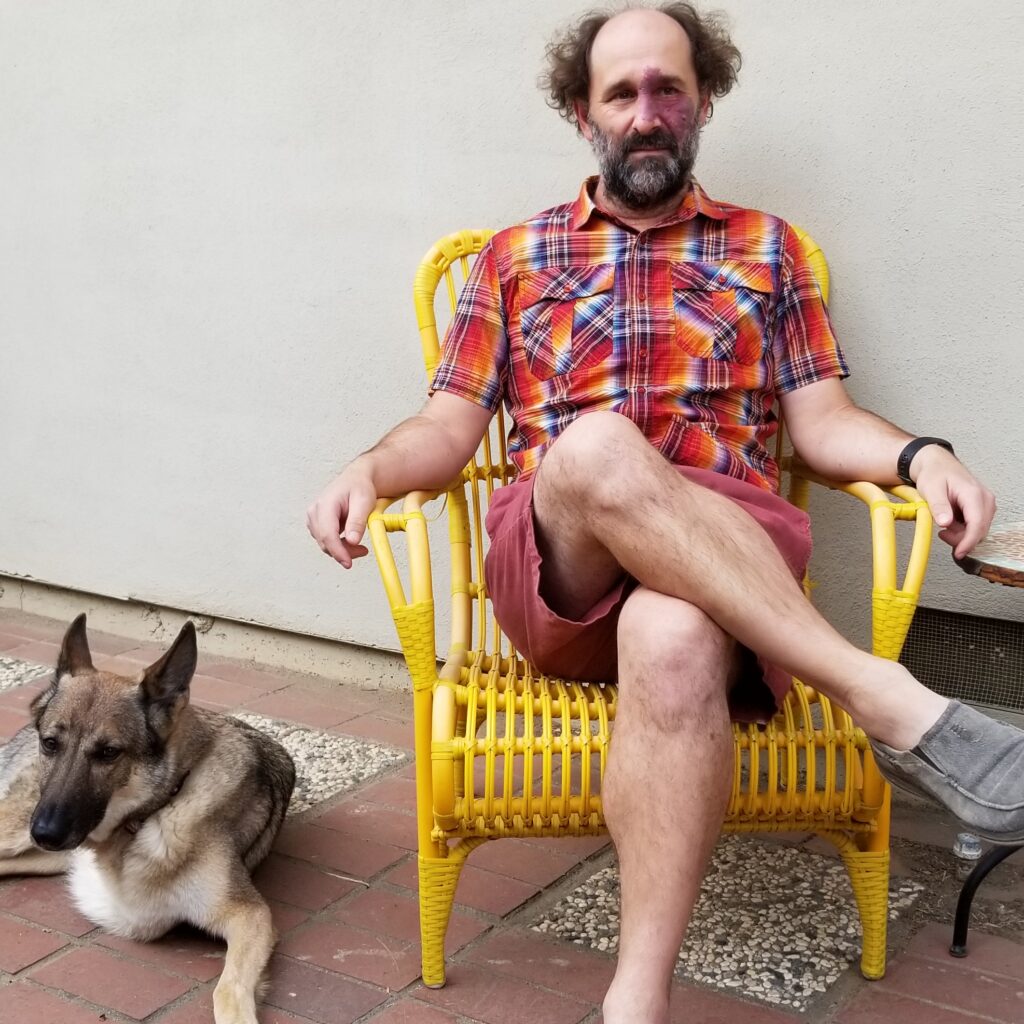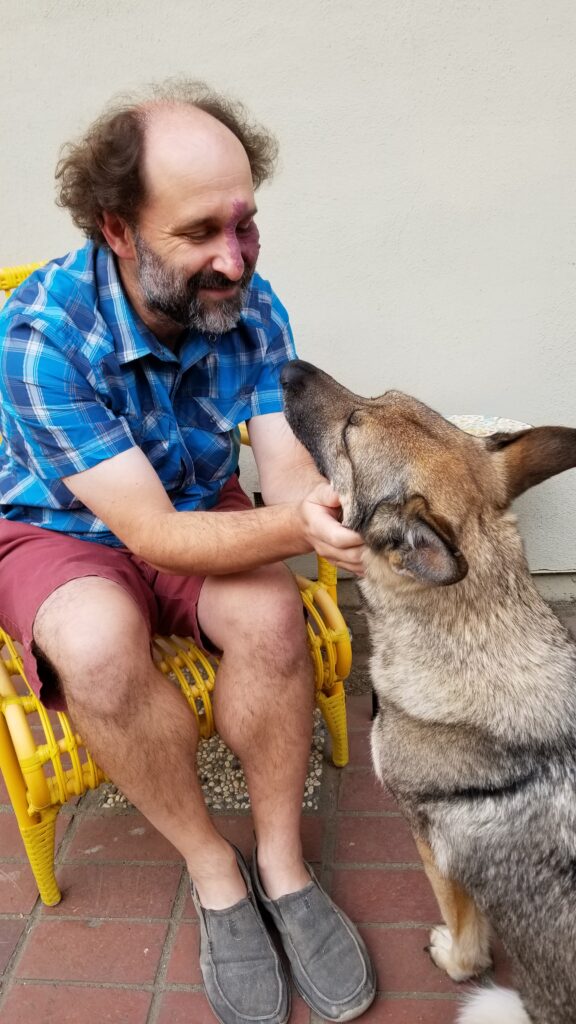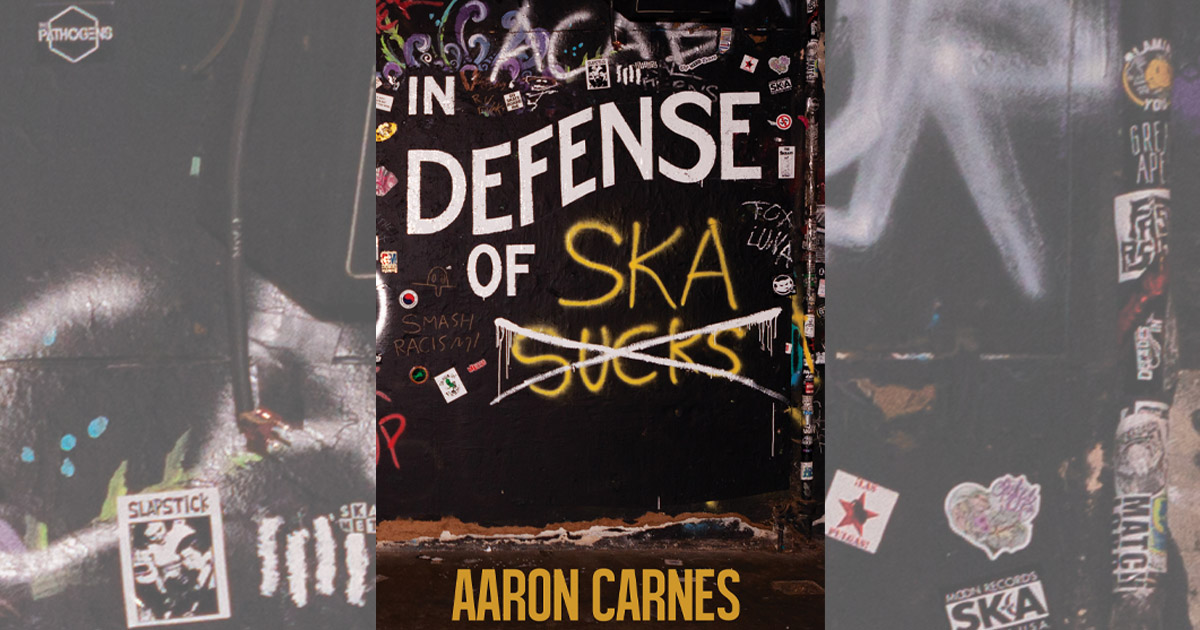Aaron Carnes’ “In Defense of Ska” has it all: Tim Armstrong, The Interrupters’ infatuation with Alex Jones, and of course Green Day getting chased out of Sacramento by boneheads. However, the book, in its widely acclaimed and expansive look at the often mocked (but rich with tradition) genre of ska, leaves out one vital story that I was sure would have made it into the book. I’m glad it didn’t, though, because now Hard Noise will exploit it for all it is worth.
The story involves Scott Sturgeon (Stza Crack), the frontman for Leftöver Crack.
Carnes set up an interview with Stza that was to take place at Holy Diver, a small club in Sacramento. When Carnes shows up, Stza is nowhere to be found. Carnes finally gets a hold of LöC’s tour manager, who says, “Oh yeah, he’s out rollerskating somewhere. I’ll give him a call.”
Turns out, Stza was at a drug store, so Carnes went to pick him up. When Carnes enters the store, he sees Stza right away.
“He’s in line, in his rollerskates, inside the store, purchasing some stuff,” Carnes says.
Stza suggests they do the interview on the tour bus, but he’s hungry, so he wants to grab food first. Carnes takes him to the Sacramento Natural Foods Co-op, a grocery store where rich people pretend to be bohemian by overpaying for mediocre food. Stza heads for the hot food buffet where he randomly puts food in his box, every now and then taking a bite. He then pays for a smoothie, but hides the hot food from the cashier.
When the leave the store, Stza turns to Carnes with a pained expression. “I know this isn’t ska of me. We got away with it because I was wearing this,” he says, pointing to his necktie.
Hard Noise: Did you try to interview people for the book that didn’t work out?
Aaron Carnes: I tried calling Tim Armstrong’s people and kept getting the runaround. He was in the East Bay movie. There’s a ska documentary he narrated, so he’s kind of a weird figure. He’s sometimes available, but real picky, I guess. Jerry Dammers (The Specials) was one I really wanted. But he’s off the radar. He was the architect of Two Tone.
I loved the part about Tim Armstrong and his reflex to add “Oi! Oi! Oi!” to everything.
And Kevin Army said “You sound like The Village People.” And that was to kind of make him feel bad. He was definitely the driving force of ska in that band. Dave Mello said he didn’t know anything about ska at all. Tim basically said, “Listen to these Two Tone records. This is what you need to know.”
The first time I got beat up by neo-Nazi skinheads was at an Operation Ivy show.
There’s interesting stuff about Nazis sort of invading Gilman, and there was a moment where they just kind of stood up to them, basically had sticks and had a big fight and sent the Nazis running and kind of ended that reign. Before that, they would come in and cause problems and they thought they could handle it, but it got to a point where they realized it wasn’t a handle-able situation.
You really went into the skinhead thing, which I appreciated. Here in Sacramento, I think I was 15 when we started an Anti-Racist Action chapter and we’d bring weapons to shows. It was interesting to see that you documented some of that. People always say that skinheads started as anti-racist, but it wasn’t really anti-racist because there was a huge anti-Pakistani sentiment.

Their subculture had nothing to do with race, one way or the other. I think that’s the main thing. It was just about the music and it was just about the culture and fashion. No one was like, “Racism good. Bad.” They dug the music and the clothes. Some of them were probably not racist. Some of them were.
It took me a while to come to that conclusion. I was reading this book called “The Walls Come Tumbling Down” [and] there was a quote from Jerry Dammers where he was like basically, “Skinheads weren’t anti-racist and that’s why we saw that and really tried to make sure kids knew when they were adopting this style that it was anti–racist.” They kind of invented that and it sort of took off from there.
There’s a lot of 7Seconds in this book. Has Kevin Seconds read it yet?
No. Actually, I toured with 7Seconds, but I don’t really know Kevin.
I don’t think he likes books that have his band in it.
When I toured with them I got along really well with the bass player and the drummer. I don’t think I ever talked to Kevin. They were all super cool guys.
Your former bandmate from Flat Planet is a cop. Do you feel any sort of responsibility for that?
Oh, he wanted to be a cop before. In fact, I guess I could take responsibility that we didn’t get bigger because when we were trying to be a big band he was like, “Well, if this band takes off then I won’t be a cop.”
Has he seen the book?
I have a part where I kinda make fun of him. He laughed.
I loved the story about Green Day getting chased out of Sacramento by boneheads.
I heard that Social Distortion played Sacramento that same night and they were dealing with Nazis also. I don’t know if it was the same group going back and forth or another group of Nazis. I think Keith [Lowell Jensen] was at that Social Distortion show and the singer was like commenting and making fun of the Nazis.
You said that your publisher was anti-ska, but he really liked this book. Any other ska converts?
Yeah, my wife. Hates ska. It made me feel good about her editing it and letting me know it was good because it’s like, is this interesting if you’re not interested in the minutiae of ska? That was like a litmus test. Are these interesting stories? Am I making arguments that are keeping your attention? I didn’t want this book only to be for ska people. I was hoping ska people would get stuff from this, but I also wanted people who were skeptical about ska or maybe liked ska back in the day but totally wrote it off. I wanted them to feel interested to read the book and actually get something from it.
Honestly, when I first heard of the book, I was like, “Not sure I could read a whole book about ska.” But there’s the earnest way you write about ska, then there’s the music history, then there are funny stories, and then there’s this whole anti-racist part which is really interesting.
I struggled to understand what I really wanted to say about ska, until in 2018 I decided to make a book proposal. I was sort of feeling like I was spinning my wheels. I thought I should write the proposal and go all in about it or let it go. After writing the proposal I was like, “Oh, I should defend ska. That’s the angle.” CLASH really liked the proposal. They were the only people that were interested, by the way. I found out after they approved it that they didn’t like ska. I only found out because I started reading their Facebook posts and I saw some anti-ska, making fun of ska. They hated ska so much that they were fascinated with it. My publisher told me, “I can listen to almost a full ska song now.”
I have written here “Gwen Stefani” and I don’t know why. Anything?
My wife was like, “You have to try and get Gwen Stefani an interview,” and I was like, “I’ll put the request out there, but there’s no chance she’s interviewing with me. Zero chance.”
Did you request?
I emailed her management just in case, but I knew it was zero.
Does she still claim ska?
To some degree. She’s not one of those people that tries to pretend that she wasn’t into ska. She was in the Fishbone documentary and she was saying how Angelo Moore was her favorite frontman.
I just want to put into print that I will fight The Interrupters for their bullshit libertarian politics. I challenge each one of them to a fistfight.
Were you familiar with that before you read my book?
No. I had no idea. But now I want to fight them all.
They’re trying to wiggle out of that. My friend Steve Shafer wrote a blog post about it and he was basing it off their actual lyrics. This is before they had a single. The guitarist posted and posted and posted on his thing and was like arguing it in that weird way where he’s being duplicitous.
I also forgot about Eric Clapton, too. I just added an Eric Clapton song onto a playlist then read that and I was like, “Oh yeah, fuck that guy.” Is he alive? Is he dead?
He’s just in the last few years talking about that. He’s completely avoided that conversation.
I forgot that’s how Rock Against Racism started! Fuck! I can’t believe I forgot that.
Just recently he’s like, “Oh yeah, I guess I was kinda racist back then.” The thing about him isn’t even the rant itself. He apologized and then said it was because a foreigner pinched his girlfriend’s butt. And then two years later he continued to defend Enoch Powell and said that he was speaking the truth. When I interviewed Pauline Black [the Selecter], just out of nowhere, she’s like, “That guy’s a fuckin’ racist.”

Do you have a favorite Hard Times ska headline? Or have you ever gotten mad at a Hard Times ska headline?
No. I think Hard Times does a good job of getting closer. Even though the jokes are always that they’re making fun of ska, they do it in a way that ska people get the joke, that this is for ska people.
You interviewed Eric Navarro and he’s definitely a ska fan.
He only accepts [pitches] where he feels like it’s coming from ska people. Johnny [Taylor] was like, “I pitch them ska articles all the time and they never take them!” and I was like, “That’s because they want them from ska people.”
I got into a Twitter fight with the cartoonist of Cyanide & Happiness. He made a dumb ska joke and I was like, “You need to learn more about ska so you can make fun of it better.” He reposted it and was like, “Oh damn!” And then I was like, “This is war.”
And then he started complaining, like, “This site sucks because now I got some guy who wrote a book about ska and he’s coming at me aggressively in my replies.” His joke was, “How do people listen to ska in a pandemic? That doesn’t make sense.” The joke is that ska is ultimately super happy. You don’t even get ska if that’s your joke. And that’s part of my goal, is that people can at least make fun of ska better.
Did you take any ska puns out of your book?
I didn’t do ska puns. I wanted to not do some of that obvious stuff. I feel like ska stuff is so insular and everybody repeats some of the same dumb stuff and I didn’t want to do that. I wanted to shine a light on it where it’s a little bit away from some of that stuff. I wasn’t into that at the time. I wasn’t into ska puns, I didn’t wear a fedora, I didn’t wear checkered … Everyone acts like that’s what it was about, but no.
You seem to get a little salty around the different waves of ska.
Yeah, I think it reinforces the idea that these five bands showed up in the ‘90s because it was a “wave,” but it wasn’t really a wave because ska was so popular in the early ‘90s. It wasn’t on the radio, but these bands would play packed out shows. It didn’t seem like ska would exist on the radio in ‘92/’93. That seemed like an absurd idea.
Why do people care about waves?
I don’t know. I feel like it’s self-defeating. You have something that’s consistently popular for decades, why not embrace that instead of talking about waves? I don’t think it’s the fans that have been pushing the wave narrative. It’s critics and media and radio people, so I think people just kind of accept that.
Wait, did you ever say your favorite Hard Times headline?
I think “Skanking is Problematic” was probably the first one. That’s a good headline. But I really like the Streetlight Manifesto one [“Streetlight Manifesto Isn’t Ska – They’re Good”], not necessarily as a headline, but as a concept. That’s the most specific joke. That’s not even for ska people; that’s for people who are obsessed with ska. That’s the only people who get that joke.
Pick up In Defense of Ska” here and check out the official playlist


